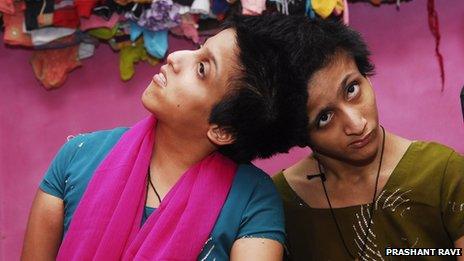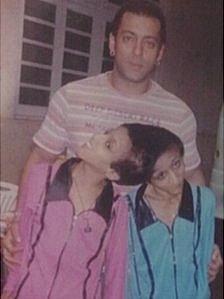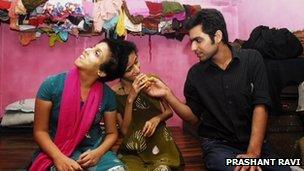India conjoined twins face uncertainty
- Published

The future of Saba (left) and Farah is uncertain
The case of teenage conjoined twins, Saba and Farah, has gripped India and the country's Supreme Court recently ordered the government to help the girls. The BBC Hindi's Vineet Khare visits the twins in their home in Patna, in the eastern state of Bihar, to find out what the future holds for them.
The court ordered the Bihar government to take the 15-year-old twins to the capital, Delhi, for treatment at a top government hospital.
But the family has refused an operation to separate them, for fear of endangering their lives, raising serious questions about their future.
The girls sat expressionless on the edge of a creaky rope bed when I entered their cellar-sized room. An old fan droned above.
With their heads joined at the side, they took turns to look at me.
But before we could exchange greetings, I was interrupted by their mother Rabia Khatoon.
"Wrap up your work fast and leave," she mutters curtly. "We have had enough of this nonsense."
With no financial help forthcoming and the health of the girls worsening, the family of 10 has been steadily losing patience.

Bollywood star Salman Khan has gifted the girls some money
They live in the highly congested lower middle-class area of Samanpura, connected by a web of narrow lanes and narrower bylanes.
Their only source of income is a small tea shop run by the girls' father, Mohammad Shakeel Ahmed.
The house, on the first floor, comprises two thinly-walled small rooms covered by a tin roof.
Doctors say the twins' case is complicated - they share an artery that carries blood to their hearts. Also, Farah has two kidneys while Saba has none.
Some say they are now staring at a bleak future.
'Be together'
The twins seemed restless and wanted to be over with the "question-and-answer session" quickly.
How difficult have the past 15 years been, I ask them?
"We spend our entire day sitting here. What can we do? We are so helpless," said Saba, conveying the girls' anger and desperation.
"Earlier, we could fill buckets with water, take a bath and do household work. Now we cannot do anything."
Farah, the weaker of the sisters, said: "Our body hurts through the day. We cannot do things we did earlier, like visiting our grandmother's place."
Would you like to undergo the operation, I ask?
"No. We always want to be together," Farah said firmly, leaving no room for ambiguity.
"We thank the Supreme Court, but we do not want the girls to be operated upon. It is too risky," their mother says.
In 2005, Abu Dhabi's crown prince Mohammed bin Zayed Al-Nahyan offered to bear the costs of their surgery, but the family declined the offer for the same reason.
Saba aspires to be a doctor "to be able to treat children like herself", while Farah wants to be a teacher.
In July, Farah suffered from severe abdominal pain which left her family in a state of panic, but her health slowly improved after doctors were called in.
"After the incident, the girls have lost their old charm. They get irritated easily. They are depressed and gripped by a fear of death," says Dr Diwakar Tejaswi who has looked after the sisters for the past two years.
The twins depend on their mother and five sisters for practically everything - from going to the bathroom to dressing or even walking.
Once asleep, they restrict themselves to one position and do not turn.
"They share a perfect understanding between them," said Dr Tejaswi.
"If one of them is happy or in pain, the other responds."
'Broken promises'
Avid fans of Bollywood actor Salman Khan, the two love singing songs from his films.

The family wants a monthly allowance from the government to pay for the girls' care
The actor even invited them to his Mumbai home and gifted them 50,000 rupees (about $900; £580) in cash on Raksha Bandhan, an Indian festival that celebrates the bond between brothers and sisters.
Their hopes of more financial help are pinned on the actor, but they have been unable to reach him.
"Everyone in our locality thinks we have secured millions of rupees as help, but apart from some money from Salman Khan, we have received nothing," Mrs Khatoon said.
The family wants the state government to pay them a monthly allowance to help take care of the girls' medical needs and diet. The BBC tried but was unable to get a response from Bihar's Chief Minister, Nitish Kumar, on this question.
Mrs Khatoon said she was frustrated with broken promises of financial help.
"So many people promised us help, but nothing came about," she complained bitterly.
So what does the future look like for the twins?
"Efforts need to be made to give them a good quality of life," says Dr Tejaswi.
"They should be provided with nutrition and proper medical support. Their interest in music should be nurtured. This will make them happy, no matter how long they last."
That is the question everyone dreads trying to answer.